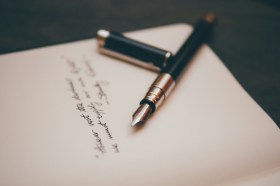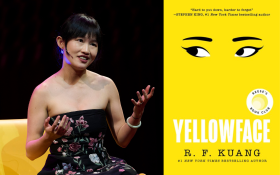Hello students, welcome to the February session of Writing Bootcamp. I trust you’ve been scribbling away during the last month. The topic of today’s lesson is cheesecake. Ahh, I see a few eyes light up in the audience! I knew that would get you sitting up in your seats.
I want to start today’s lesson with a show of hands. How many of you have sat down to write the great novel and simply had all thought, dreams, aspirations, grand designs wiped from your intellect? Yes. I see a few tentative hands raised. Well, welcome to the club. A large, illustrious and prestigious institution with many millions swelling its ranks; called the ‘I could write the great novel if only I had a great idea’ club. Most people, if they don’t have the will, stamina, love of character, reading or writing, may as well make a cheesecake instead.
The question you need to ask yourself is ‘Why am I doing this?’ When baking a cheesecake the answer is easy, you’re making it because it tastes good. But when it comes to writing, so many people sit in tortured angst, faces strangely illuminated by their blank screens. Why?
In my ten years as an editor I’ve met a lot of people who have started writing novels, but few who have finished. This is one of the many reasons why I will not begin to edit a work unless I know the writer has completed at least the first draft. I am enraged whenever I hear someone half-sloshed at a soiree say ‘I could have written a better novel than that. Honestly, what passes as fiction nowadays…’ Well if you think it’s so easy, let’s see you put your pen where your pucker is.
Can anyone tell me why they want to write? Yes, Martin?
‘I want to be published.’
Hmm. Anyone else?
‘I want to be rich and famous like Stephen King.’
If these are truly your motivations then hang up your pen and paper now. It’s not going to happen. Not if that’s the only reason you’re doing it. This is like saying ‘I am making a cheesecake because I want to be Delia Smith’. It’s all back to front. I’m sure Delia, if I can presume to speak for her, learned to love cooking before she became famous for all those wonderful recipes. And if she loves cooking, she sure must love to eat. I am baffled by people who say they want to write, but have no time, or inclination, to read.
When writing a novel (just like making a cheesecake), you have to have the right ingredients (read characters, plot, theme, skill), and you have to try one recipe or another, until you find the one that reads well (or tastes good). When you are writing ask yourself ‘Can I stick with this? Is this something I absolutely love talking about?’ Is this story something you will corner a person with at a party, entertaining them into the wee small hours with your thickness of plot and whimsy of character? Or do you absolutely hate the monster you’ve created?
Martin, do you consider yourself a writer?
‘Yes, I guess so.’
What do you write?
‘I don’t know … I’m working on a manuscript.’
How many pages have you written?
‘About six.’
If you call yourself a writer simply because you picked up a pen and wrote with it, I’d be entitled to put ‘carpenter’ on my resume, simply because I’d banged a nail into a wall.
Most people learn to read and write in kindergarten. Their teacher stands above them correcting the length or slant of the letter. A kindergarten teacher’s praise for full stops and correct spelling is not enough to make you a writer. Writing is like any job, it takes hard work, perseverance and crafting. I have never made cheesecake, so the first time I make it, it will not be for a dinner party with 20 guests. Firstly I will make it for myself. Then the second time for my partner, the third for my neighbours and maybe the fourth time, just maybe, if it works out, I will present it to my dinner guests. How many people write once, then say they want to publish? It takes a brilliant and extremely sensitive mind to create something which is publishable the first time around, and of the hundreds of first time books I have read, I have yet to see a first draft of a first book published.
Some very simple questions can help you decide whether your writing is worth seeing through to the end:
1. Why am I writing this? What’s my purpose?
2. Am I investing the amount of time necessary for me to become a good writer?
3. How can I re-prioritise so that my writing development is in with a chance?
4. How can I learn about novel writing?
5. Am I doing enough drafting?
We’ll be exploring the answers to these questions during this year’s Writing Bootcamp course. But for now I just want you to think about why you want to be a writer and how you are going to achieve that aim.
If you’re writing a thesis you may, by the end of the year or three just think ‘I hate this b&%!@rd of a work. I never, ever, want to see, or touch this thing again.’ You’ve paid your university fees, attended classes and want to have a PhD after your name, so your motivations are slightly different. But when it comes to a novel, you really do have to be comfortable with your creation. You need to be happy for it to go on living a life once you have launched it into the reading public’s stratosphere. After all a novel lives on after your death (then again with modern day binding …), a cheesecake, if it’s any good, lasts only a few minutes.
Homework
Imagine you are 80 years old and speaking to your grandchild. Tell her about the day you decided to be a writer, and that seminal moment when you realised you had to drop other things to develop your writing. If you haven’t experienced this lightbulb moment, write a fictitious account. Tell her about your most significant written work. If you haven’t written your magnum opus yet, I’d like you to imagine what it will be. Max 500 words.
Post your homework to http://writingbootcamp.artsblogs.com
Congratulations to Deb and Victoria May for their fine homework from January Bootcamp. I was happy to see plenty of power-packed verbs, and a judicious use of adjectives. And not a tall dark and handsome man in sight. Well done ladies!




